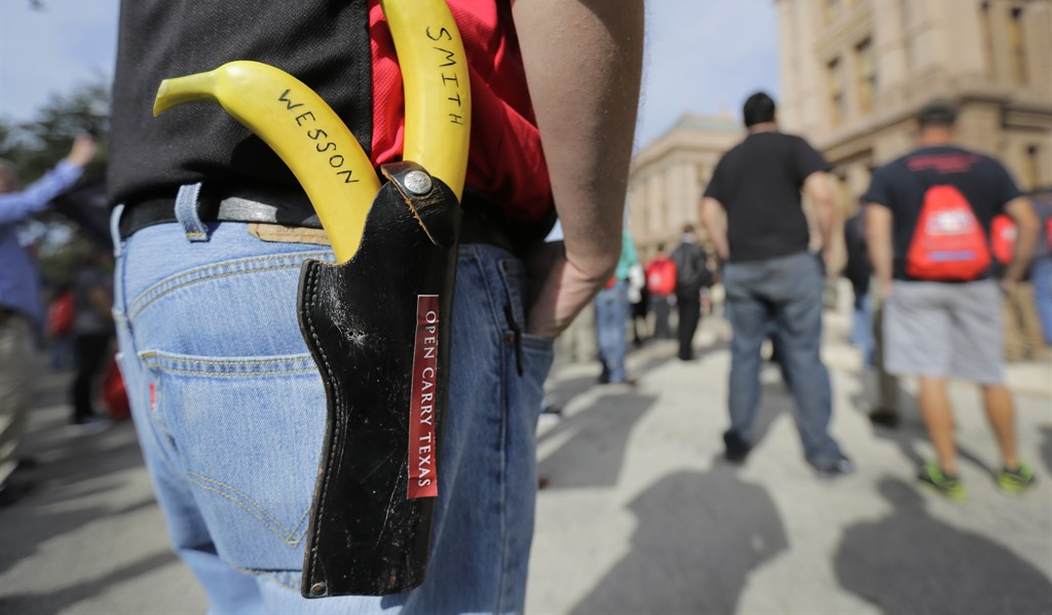For several months now city council members in St. Louis, Missouri have floated the idea of banning the open carrying of firearms unless someone possesses an active concealed carry license, and on Thursday the council unanimously approved a new ordinance doing just that. The proposal is expected to swiftly be signed into law by Mayor Tishaura Jones, who’s been under fire by critics for text messages in which she cast doubt on the effectiveness of “strict” gun laws compared to “investing in the people.”
Jones is right in noting that the restrictive gun control laws in places like Chicago have little-to-no effect on violent criminals, and the new ordinance in St. Louis is utterly toothless compared with the felony charges that one can face in Chicago or New York City for simply possessing a firearm without a license.
The bill would outlaw “openly carrying or displaying any firearm readily capable of lethal use within the City unless the person possesses a valid concealed carry endorsement or permit.”
Violators will be issued an ordinance violation. Punishment for adults could include a $500 fine, 30 days in prison or community service. Minors could be fined up to $500 or sentenced to community service.
Alderwoman Cara Spencer, who introduced the bill, said last week that the legislation won’t be an immediate fix.
“This is not going to overnight address the violence in our communities, but it is a tool,” Spencer said in a July 14 board meeting. “It is a path forward.”
The bill has an emergency clause, meaning it would take effect immediately if approved.
I have a slightly different take than Spencer when it comes to her ordinance. It’s not going to address the violence in St. Louis at all, and the only “path forward” it represents is a step towards the end of firearms preemption in Missouri, which is exactly what St. Louis officials are hoping will happen at the ballot box next year.
The ostensible reason for the ordinance, according to Spencer and others, are the number of juveniles that are supposedly walking around the city openly carrying firearms. But under the measure adopted on Thursday, the only consequence for doing so will be a $500 fine that their parents will have to pay or a few hours of community service that may be handed down in lieu of a fine.
It’s downright laughable to think that young violent offenders are going to be dissuaded from their crimes because of the possibility of a fine or community service when they’re already committing much more serious offenses.
The “2022 City of St. Louis Family Court Report to The Community,” released in late May, reveals disturbing data when it comes to juvenile crime. It shows the number of felony referrals police sent to juvenile courts jumped from 535 in 2021 to 878 in 2022.
Misdemeanor referrals increased from 459 in 2021 to 714 in 2022, and, status referrals, such as curfew violations, truancy and underage drinking, also jumped from 104 in 2021 to 158 in 2022.
Meanwhile, according to that same report, there were a total of 219 juvenile defendants who were sent to the city’s Juvenile Detention Center as a consequence of their crimes, with the average stay coming in at just over a month in custody. That means that juveniles charged with a felony crime only stand about a 1-in-4 chance of serving any time in detention, and those that are sentenced to custody are swiftly returned home and to the streets, as Fox 2 in St. Louis reported last fall.
Officers with the North County Police Cooperative say they’re arresting children for felony crimes, only to find them on the streets hours later.
The co-op brought in the courts, hoping to find a solution. FOX 2 was granted exclusive access to the discussion.
“We are headed in the direction of doubling the amount of juvenile crimes that we’re documenting versus last year,” Major Ron Martin, North County Police Cooperative, said.
…
“We take them to juvenile and then they’re back out within an hour and in another stolen car,” Dellwood Precinct Commander Lt. Etheria Thompson said.
They discussed the point system, which, under Missouri law, means it takes a crime with a score of 15 points to get locked up; or several crimes that add up to 15.
Pagedale Interim Police Chief Anthony Huckleberry exclaimed that some offenders have “…reached that level several times!”
Lt. Huckleberry, along with the head of the NCPC Auto Theft Task Force, said they still don’t see juveniles locked up when they reach that point level.









Join the conversation as a VIP Member